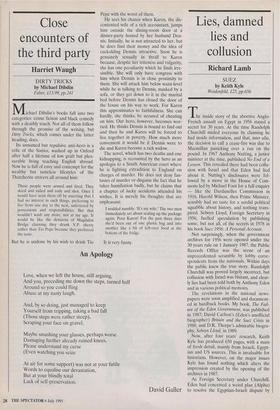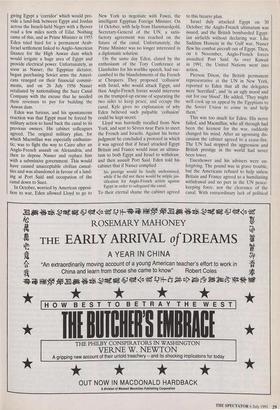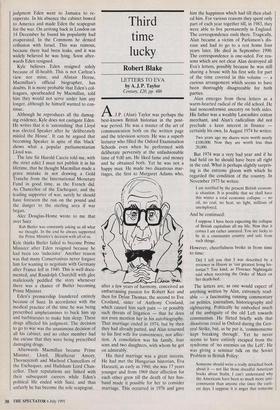Lies, damned lies and collusion
Richard Lamb
SUEZ by Keith Kyle Weidenfeld, £25, pp.656 The inside story of the abortive Anglo- French assault on Egypt in 1956 stayed a secret for 30 years. At the time Randolph Churchill misled everyone by claiming he had inside information, and that, inter alia, the decision to call a cease-fire was due to Macmillan panicking over a run on the pound. In 1967 Anthony Nutting, a junior minister at the time, published No End of a Lesson. This revealed there had been collu- sion with Israel and that Eden had lied about it. Nutting's disclosures were fol- lowed by a move in the House of Com- mons led by Michael Foot for a full enquiry — like the Dardanelles Commission in 1916. Harold Wilson, then Prime Minister, sensibly had no taste for a sordid political squabble about history, and nothing trans- pired. Selwyn Lloyd, Foreign Secretary in 1956, fuelled speculation by publishing some, but not all, of the secrets in 1978 in his book Suez 1956: A Personal Account.
Not surprisingly, when the government archives for 1956 were opened under the 30 years rule on 1 January 1987, the Public Records Office was the scene of an unprecedented scramble by lobby corre- spondents from the nationals. Within days the public knew the true story. Randolph Churchill was proved largely incorrect, but collusion with Israel was blatant, and clear- ly lies had been told both by Anthony Eden and in various political memoirs.
The revelations in the national news- papers were soon amplified and document- ed in hardback books. My book, The Fail- ure of the Eden Government, was published in 1987; David Carlton's (Eden's unofficial biographer) Britain and the Suez Crisis in 1988, and D.R. Thorpe's admirable biogra- phy, Selwyn Lloyd, in 1989.
Now, after four years' research, Keith Kyle has produced 650 pages, with a mass of fresh detail, mainly from Israeli, Egypt- ian and US sources. This is invaluable for historians. However, on the major issues Kyle has found nothing which alters the impression created by the opening of the archives in 1987.
As Foreign Secretary under Churchill, Eden had conceived a weird plan (Alpha) to resolve the Egyptian-Israeli dispute by giving Egypt a `corridor' which would pro- vide a land-link between Egypt and Jordan across the Israeli-held Negev with a flyover road a few miles north of Eilat. Nothing came of this, and as Prime Minister in 1955 Eden tried hard for a permanent Arab- Israel settlement linked to Anglo-American finance for the High Aswan dam which would irrigate a huge area of Egypt and provide electrical power. Unfortunately, as soon as Nasser, the Egyptian dictator, began purchasing Soviet arms the Ameri- cans reneged on their financial commit- ments, and on 26 July 1956 Nasser retaliated by nationalising the Suez Canal Company with the excuse that he needed their revenues to pay for building the Aswan dam.
Eden was furious, and his spontaneous reaction was that Egypt must be forced by military action to hand back the canal to its previous owners. His cabinet colleagues agreed. The original military plan, for which Macmillan was especially enthusias- tic, was to fight the way to Cairo after an Anglo-French assault on Alexandria, and then to depose Nasser and replace him with a submissive government. This would have caused unacceptable civilian casual- ties and was abandoned in favour of a land- ing at Port Said and occupation of the canal down to Suez.
In October, worried by American opposi- tion to war, Eden allowed Lloyd to go to New York to negotiate with Fawzi, the intelligent Egyptian Foreign Minister. On 14 October, with help from Hammarskjold, Secretary-General of the UN, a satis- factory agreement was reached on the future of the canal. Unfortunately, the Prime Minister was no longer interested in a diplomatic solution.
On the same day Eden, elated by the enthusiasm of the Tory Conference at Llandudno for his warlike speech, had suc- cumbed to the blandishments of the French at Chequers. They proposed `collusion' with Israel, who would attack Egypt, and then Anglo-French forces would intervene on the trumped-up excuse of separating the two sides to keep peace, and occupy the canal. Kyle gives no explanation of why Eden believed such palpable `collusion' could be kept secret.
Lloyd was hurriedly recalled from New York, and sent to Sevres near Paris to meet the French and Israelis. Against his better judgment he concluded a protocol in which it was agreed that if Israel attacked Egypt Britain and France would issue an ultima- tum to both Egypt and Israel to withdraw, and then assault Port Said. Eden told his cabinet that if Nasser complied
his prestige would be fatally undermined, while if he did not there would be ample jus- tification for Anglo-French action against Egypt in order to safeguard the canal.
To their eternal shame the cabinet agreed to this bizarre plan.
Israel duly attacked Egypt on 30 October; the Anglo-French ultimatum was issued, and the British bombarded Egypt- ian airfields without declaring war. Like Saddam Hussein in the Gulf war, Nasser flew his combat aircraft out of Egypt. Then, on 6 November, Anglo-French forces assaulted Port Said. As over Kuwait in 1991, the United Nations went into action.
Pierson Dixon, the British permanent representative at the UN in New York, reported to Eden that all the delegates were `horrified', and 'in an ugly mood and out for our blood'. He added, 'They might well cook up an appeal by the Egyptians to the Soviet Union to come in and help them.'
This was too much for Eden. His nerve failed, and Macmillan, who all through had been the keenest for the war, suddenly changed his mind. After an agonising dis- cussion the cabinet agreed to a cease-fire. The UN had stopped the aggression and British prestige in the world had never been lower.
Eisenhower and his advisers were un- forgiving. The pound was in grave trouble, but the Americans refused to help unless Britain and France agreed to a humiliating withdrawal and no part in the UN peace- keeping force, nor the clearance of the canal. With extraordinary lack of political judgment Eden went to Jamaica to re- cuperate. In his absence the cabinet bowed to America and made Eden the scapegoat for the war. On arriving back in London on 14 December he found his popularity had evaporated. In the Commons he denied collusion with Israel. This was ruinous, because there had been leaks, and it was widely believed he was lying. Soon after- wards Eden resigned.
Kyle believes Eden resigned solely because of ill-health. This is not Carlton's view nor mine, and Alistair Home, Macmillan's official biographer, has doubts. It is more probable that Eden's col- leagues, spearheaded by Macmillan, told him they would not serve under him any longer, although he himself wanted to con- tinue.
Although he reproduces all the damag- ing evidence, Kyle does not castigate Eden. He writes that it is 'astonishing' that Lloyd was elected Speaker after he 'deliberately misled the House'. It can be argued that becoming Speaker in spite of this 'black' shows what a popular parliamentarian Lloyd was.
The late Sir Harold Caccia told me, with the strict edict I must not publish it in his lifetime, that he thought Macmillan made a grave mistake in not drawing a Gold Tranche from the International Monetary Fund in good time, as the French did. As Chancellor of the Exchequer, and the leading supporter of war, surely he should have foreseen the run on the pound and the danger to the sterling area if war began.
Alec Douglas-Home wrote to me that over Suez
Rab Butler was constantly asking us all what we thought. In the end he always supported the Prime Minister's decision with all of us.
Kyle thinks Butler failed to become Prime Minister after Eden resigned because he had been too Indecisive'. Another reason was that many Conservatives never forgave him for wanting to negotiate with Germany after France fell in 1940. This is well docu- mented, and Randolph Churchill with glee maliciously peddled the story whenever there was a chance of Butler becoming Prime Minister.
Eden's premiership foundered entirely because of Suez. In accordance with the medical practice of the time he was being prescribed amphetamines to buck him up and barbiturates to make him sleep. These drugs affected his judgment. The decision to go to war was the unanimous decision of all his cabinet, and no other member had the excuse that they were being prescribed damaging drugs.
Afterwards Macmillan became Prime Minister. Lloyd, Heathcoat Amory, Thorneycroft and Macleod Chancellors of the Exchequer, and Hailsham Lord Chan- cellor. Their reputations are linked with their subsequent careers while Eden's political life ended with Suez, and thus unfairly he has become the sole scapegoat.




















































 Previous page
Previous page